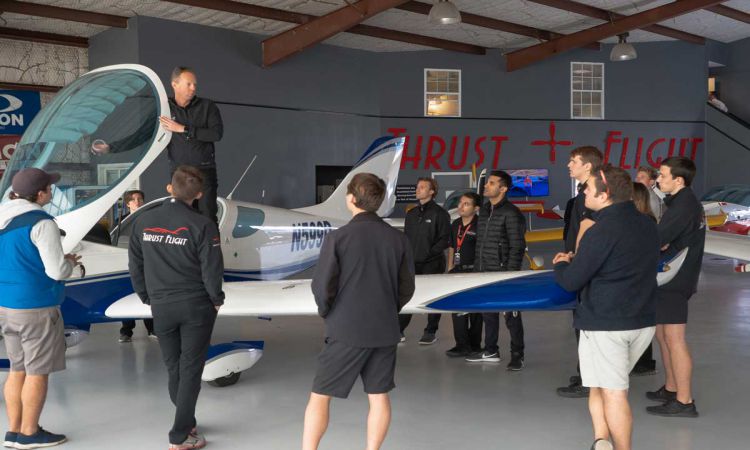 When you finally decide to become a flight instructor, you still need to consider a few factors before becoming one. This blog post will review the six main factors you should consider before starting your training. With all these factors in mind, becoming a flight instructor can be a very rewarding career choice.
When you finally decide to become a flight instructor, you still need to consider a few factors before becoming one. This blog post will review the six main factors you should consider before starting your training. With all these factors in mind, becoming a flight instructor can be a very rewarding career choice.
Why do you want to become a flight instructor?
Becoming a flight instructor is a rewarding experience that allows individuals to share their passion for aviation with aspiring pilots. From being able to impart knowledge and skills to providing essential feedback, aircraft instructions have the power to influence the life of a student pilot. It is necessary to understand what it takes to become qualified as an instructor and also why you want to pursue this career path in the first place. Having clear goals when entering such a program can provide extra motivation and drive to complete it successfully. Several factors need to be considered when going for a flight instructor course. You should factor in your capabilities and enthusiasm for teaching, understanding the background of aircraft instruction, gaining practical experience, learning different training methods, creating effective lesson plans, and staying current with regulatory requirements. Doing so will help ensure that your new role as an instructor is one you will excel at and find joy in doing every day.
What are your goals and objectives in becoming a flight instructor?
Becoming a flight instructor is incredibly worthwhile and requires keen foresight and planning. It is essential to outline your initial goals and objectives when going for a flight instructor course, including whether you will work part-time or full-time, what flight students you are hoping to target, and if you want to provide flight services for these students. Prior knowledge of flight theory and mechanics is beneficial as there are six critical factors to consider: personality traits, flight training requirements, flight experience, medical qualifications, financial resources, and ATP qualifications. With this information in hand, it will be easier to define further the goals and objectives you wish to achieve through taking a flight instructor course.
What is your level of experience and expertise as a pilot?
When considering taking a flight instructor course, it is essential to assess your level of experience and expertise as a pilot. This includes the frequency of your flights, the variety of aircraft you have flown, the endorsements or certifications you may have acquired over time, and the number of hours you’ve spent in an airplane. Furthermore, having an understanding of regulations and avionics can prove beneficial in a flight instructor course. The more knowledge and experience you have will prepare you optimally for completing the training successfully. This should help potential students plan and decide if they are ready to take on such an endeavor.
What type of personality do you have that would make you a successful flight instructor?
People who decide to pursue becoming flight instructors must possess qualities that will give them an edge. A good flight instructor must have strong analytical skills, an aptitude for problem-solving, great attention to detail, patience, and interpersonal skills to properly communicate with students, the ability to remain calm in stressful situations, and dedication and commitment to the profession. These characteristics are key for any successful instructor as they are necessary for keeping up with the ever-evolving regulations of this field. Furthermore, having a friendly demeanor and demonstrating proper decision-making abilities is also essential for maintaining safety standards and boosting the performance confidence of students alike. Ultimately, becoming an effective flight instructor takes a specific type of reliable, personable, and organized personality.
Are you patient enough to be a good teacher?
Becoming a flight instructor is no easy task and requires more than just flying skills. It takes courage, creativity, and (the most critical factor) patience. A patient demeanor is crucial for good teaching as it allows instructors to think clearly even in stressful situations and cultivate an atmosphere of trust for their students. A good teacher needs to set reasonable expectations and encourage their students with patience, so remaining calm in tense moments and understanding is imperative.
Do you have the necessary people skills required to communicate well with students?
Becoming a flight instructor requires more than technical know-how; it also needs people skills. When becoming an instructor, consider your ability to communicate with your students effectively. Conveying complex information clearly and articulately is critical to successful instruction, as understanding the material is usually just as important as mastering the practical skills of flying. Having the right attitude towards teaching is essential, too; an instructor should be knowledgeable yet approachable, inspiring confidence in their students while being patient at the same time. If you have good people skills, are confident in your field, and have endless patience for guiding students around obstacles, you’re on track to becoming a successful flight instructor.
If you are serious about becoming a flight instructor, these are the six factors you must consider before making any decisions. Weigh your options carefully and choose the path best suited for you and your goals.











